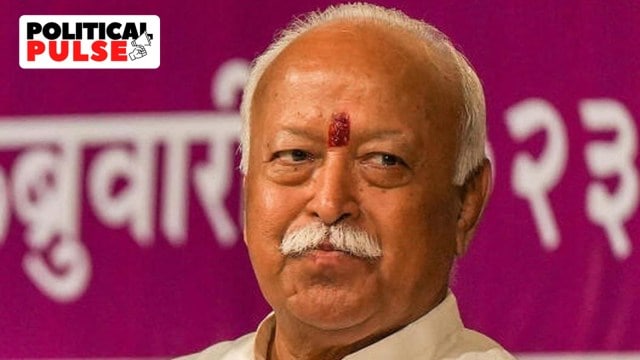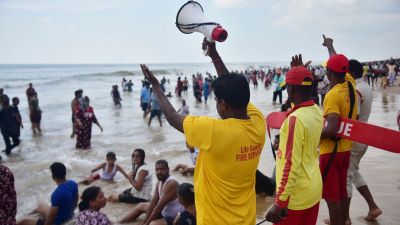RSS likely to bring NRC back on agenda, discuss how it should be implemented so no ‘Indian citizen’ feels threatened
The Akhil Bharatiya Pratinidhi Sabha, the Sangh's top decision-making body that will meet in Bengaluru from March 21 to 23, will discuss if NRC should be conducted in specific states; no call yet on a resolution
 RSS chief Mohan Bhagwat. (Source: FB)
RSS chief Mohan Bhagwat. (Source: FB)Over five years ago, amid nationwide protests against the Citizenship Amendment Act (CAA) and the proposed National Register of Citizens, or NRC, Prime Minister Narendra Modi said at a public meeting in Delhi on December 22, 2019, that his government had not discussed NRC since returning to power earlier that year. Since then, the government has reiterated this stand on several occasions.
However, the issue appears to be making a return to the national political discourse, with NRC likely to be among the key agenda for the annual meeting of the RSS’s Akhil Bharatiya Pratinidhi Sabha (ABPS), which is its highest decision-making body. The meeting this year will be held in Bengaluru from March 21 to 23. Sources said the ABPS was likely to discuss the implementation of NRC across India and deliberate on how it should be carried out in certain states.
“The demography of several states in the country has changed because of illegal immigration. In Jharkhand, even the Christian population is declining when compared to Muslims. The demography of even strategically sensitive states, such as Arunachal Pradesh, is fast changing because of the influx from Bangladesh. We all know what has happened in Assam and West Bengal. It is the Union government’s duty to identify illegal immigrants and deport them,” said an RSS office-bearer.
According to the Sangh functionary, the ABPS will likely discuss how NRC should be implemented so that no “Indian citizen” feels threatened. Sources said the ABPS might also discuss if NRC should be conducted in specific states.
The ABPS is also expected to pass a resolution on at least “two issues of national importance” during the meeting. It is not yet clear, however, whether there will be a resolution on NRC.
“Whether a resolution should be passed on an issue is decided during the meeting and not beforehand. It will depend on what the senior leaders decide on how the issue should be taken up further,” said another RSS leader.
Why the RSS meeting is important
The ABPS summit is the most important meeting of the RSS where all its top leaders, including its sarsanghchalak or chief Mohan Bhagwat and second-in-command Dattatreya Hosabale, will be in attendance. The BJP president and other senior leaders of the party may attend the meeting.
The issues discussed and the decisions taken not only give direction to the Sangh for the following year but also send a signal to the government on what it wants implemented at policy level.
Since the 2019 protests, the government has not made any move or significant statement on NRC, with the issue perceived to have been relegated to the backburner. Even the BJP, which had the issue in its manifesto for 2019 elections, dropped it from the 2024 poll manifesto.
BJP leaders, however, have, off and on, made noises on the issue. Ahead of the Jharkhand Assembly elections last year, Union Minister Shivraj Singh Chouhan said the government would ensure the implementation of NRC in the state. “NRC will be implemented in Jharkhand and illegal immigrants will be identified and removed from the state,” Chouhan, who was the BJP’s election in-charge for the state, said in Ranchi in October. Recently, Jharkhand MP Nishikant Dubey also made comments on NRC.
The RSS position on NRC
The Sangh has always maintained there should be a nationwide NRC. In October 2019, then RSS general secretary Suresh Bhaiyyaji Joshi said after the Sangh’s Karyakari Mandal baithak in Bhubaneshwar, “It is the job of every government to prepare an NRC. Many types of infiltration have happened. Hence, it is important to prepare an NRC once and identify all those who are not Indian citizens, and then draft a policy to decide what should be done about them.”
In July 2021, Bhagwat tried to allay concerns, claiming at an event in Assam that a certain section of people had lent a communal colour to the issue to derive political mileage. “It has become a Hindu-Muslim issue when it’s not even one,” he said.
Bhagwat said NRC was a way to determine genuine citizens residing in India. “Such exercises are followed in many countries across the world. What to do with them (those who are left out) is another matter, but at least let us first find out who the citizens in the country are,” he said.
Bhagwat has also repeatedly said that “demographic imbalance” in India was not just due to the higher birth rate of a particular community but also due to undocumented migration.
Despite the government not making its stand clear on the issue for over five years, NRC remains on the horizon. It could be a logical follow-up to the Census, which is expected to take place latest by next year.
Under the law, it is the logical step following the update of the National Population Register (NPR), which will be conducted with the houselisting phase of the Census. The houselisting phase is likely to be conducted next year if the government decides to go ahead with the Census.
It is enshrined in the Citizenship Rules of 2003 under the Citizenship Act of 1955 that NRC shall be carried out based on the NPR. A reading of the rules shows that NPR is part of the rules framed for NRC.





- 01
- 02
- 03
- 04
- 05


























